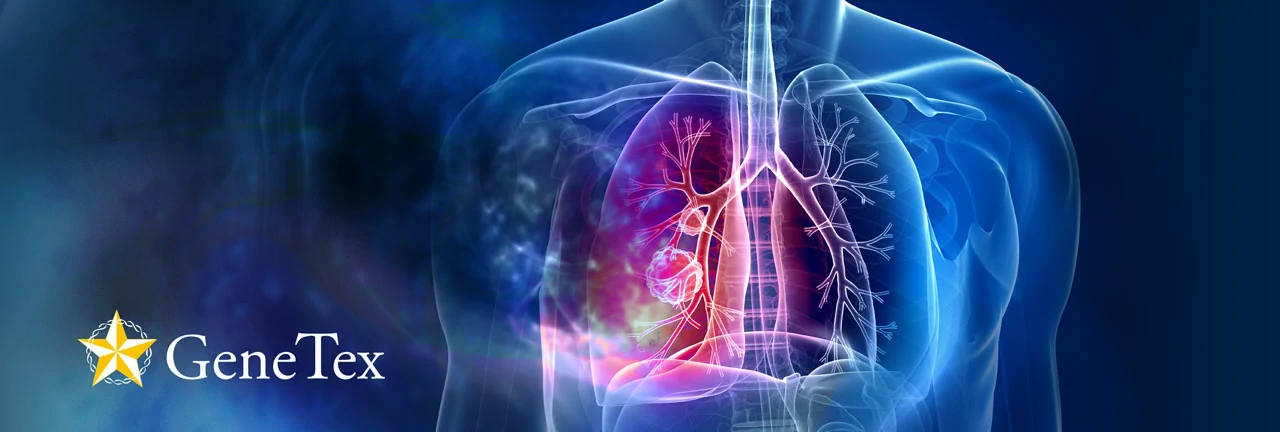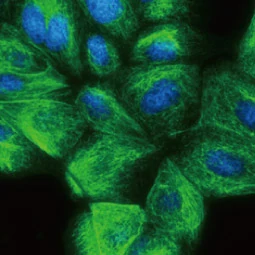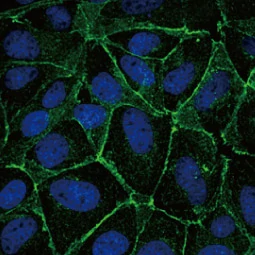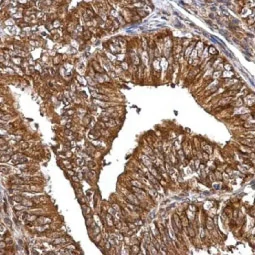The chemokine C-X-C motif chemokine ligand 14 (CXCL14) has multiple functions that include recruitment and maturation of immune cells in addition to epithelial cell motility (1). It is dysregulated in a number of malignancies, though it has been reported to have both tumor suppressor and tumor promoter features (1). Nevertheless, CXCL14 overexpression in several cancers is associated with enhanced invasiveness, metastasis, and poor patient prognosis, thereby piquing interest as to whether it might be a valid therapeutic target.
A new study by Chang et al. explores the role of CXCL14 and its receptor ACKR2 in promoting lung cancer metastasis (2). The authors first reviewed expression data sets of normal lung and lung cancer tissues and found that CXCL14 expression correlates with clinical stages of disease. Both in vitro and in vivo experiments demonstrated that CXCL14 significantly enhances lung cancer cell motility, and this effect is dependent on the presence of ACKR2, a factor known to be essential for CXCL14-induced signaling and cellular effects in different cancer cells. The CXCL14/ACKR2 axis activates signaling pathways involving phospholipase Cβ3 (PLCβ3), protein kinase Cα (PKCα), and proto-oncogene c-Src, leading to upregulation of NF-κB transcriptional activity, epithelial-mesenchymal transition (EMT), and increased migration of lung cancer cells. Thus, the work by Chang et al. identifies how the CXCL14/ACKR2 axis drives lung cancer metastasis and highlights CXCL14 as a potential focus of novel therapies.
GeneTex is dedicated to developing highly validated antibodies to support exciting cancer research like that presented by Chang et al., who used GeneTex’s CXCL14 antibody [N3C3] (GTX108431), Vimentin antibody (GTX100619), ICAM1 / CD54 antibody [N1C2] (GTX100450), VCAM1 / CD106 antibody [N1N2], N-term (GTX110684), E-Cadherin antibody (GTX100443), MMP2 antibody (GTX104577), MMP9 antibody [N2C1], Internal (GTX100458), MMP12 antibody [N3C1], Internal (GTX100704), and several others in the study described above. For more information, please see the highlighted products below and visit www.genetex.com.
Highlighted Products
References:
- Mol Carcinog. 2020 Jul; 59(7): 794–806.
- Int J Biol Sci. 2023 Feb 27;19(5):1455-1470.

![CXCL14 antibody [N3C3] (GTX108431) CXCL14 antibody [N3C3] (GTX108431)](/upload/media/MarketingMaterial/Newsletter/2023/CXCL14_ACKR2/255x255_01.webp)

![ICAM1 / CD54 antibody [N1C2] (GTX100450) ICAM1 / CD54 antibody [N1C2] (GTX100450)](/upload/media/MarketingMaterial/Newsletter/2023/CXCL14_ACKR2/255x255_03.webp)

![VCAM1 / CD106 antibody [N1N2], N-term (GTX110684) VCAM1 / CD106 antibody [N1N2], N-term (GTX110684)](/upload/media/MarketingMaterial/Newsletter/2023/CXCL14_ACKR2/255x255_05.webp)

![MMP9 antibody [N2C1], Internal (GTX100458) MMP9 antibody [N2C1], Internal (GTX100458)](/upload/media/MarketingMaterial/Newsletter/2023/CXCL14_ACKR2/255x255_07.webp)
![MMP12 antibody [N3C1], Internal (GTX100704) MMP12 antibody [N3C1], Internal (GTX100704)](/upload/media/MarketingMaterial/Newsletter/2023/CXCL14_ACKR2/255x255_08.webp)